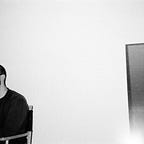Emma Spearing’s Whole and Charmaine Childs’ POWER: A Review
Placing two shows like Emma Spearing’s Whole and Charmaine Childs’ POWER on a double bill is a daring feat. Each show probes and challenges the audience, forcing them to gaze inward and meditate on the weight of trauma. On paper, this could be an incredibly difficult theatre experience, and in some ways it is. However, the pieces are smart and engaging in a way that goes far beyond their subject matter. The two performances complement each other perfectly, almost mirroring each other as responses to very specific forms of personal devastation and the fallout from that devastation.
The former, Spearing’s frank and starkly emotional Whole, is a whirlwind both in terms of its form and its affect. Blending dance, poetry and spoken word, Spearing flickers between extreme emotions, sometimes existing within multiple emotions at once. Simultaneously heartbreakingly tender and searingly angry, Spearing represents the insurmountable tumult of grief with devastating accuracy. At times, she plays Blur’s “Tender” delicately on the acoustic guitar while a voiceover screams in raging agony. It’s tremendously effective and emotionally devastating, a reminder of the literal insanity of grief. The performance drifts in and out of lucidity, always engaging but sometimes abstract and formless. The moments of lucidity are gut-wrenchingly powerful, taking the form of emotional stories from Spearing’s life and the moments leading up to her sister’s death. The events of the actual night of her death are dispersed throughout, with details slowly revealed that inform the previous stories, compounding and complicating the experience of loss.
Spearing speaks with conflicting emotions about the spiritual, mystical aspects of her life. While she is clearly deeply indebted to her awareness of the supernatural — she recalls fond (if spooky) memories of her and her sister seeing otherworldly figures, and having a spiritual awakening after taking magic mushrooms — she is also incredibly angry at the charlatan healers who promised to cure her sister’s cancer. Holding these contradictory feelings at the same time, and expressing that contradiction truthfully and without minimising either side is a truly incredible feat, one which Spearing pulls off with great success. This conflicted spirituality permeates the piece, granting it an almost transcendental quality. Spearing speaks to her sister in the form of an orange, treating it with reverence and respect before eventually peeling and eating it, savouring each bite. These small connections with nature and the ineffable nature of life are tender and feel sacred.
Charmaine Childs’ POWER, conversely, dwells almost entirely in the upbeat. As a piece, it works as both introduction and retrospective for Childs, a seemingly paradoxical combination which Childs nevertheless manages to represent effortlessly, the entire experience buoyed by her undeniable charm and charisma. Childs both performs and reflects on performing, each of which enriches the audiences’ understanding of the other. As she lifts bricks, performs handstands and tears books in half, she delves into power as both a mental and physical state. Utilising voiceovers from interviews with seemingly random members of the public, she explores the meaning of power and how it relates to different people. Testimony from immigrants, widows and widowers, and women in positions of authority deepen the notion of power, allowing it to become almost synonymous with self-actualisation.
While Childs performs her genuinely astonishing feats of strength, she is incredibly candid about her process, creating a sense of vulnerability that is at odds with the displays of power on stage. It is this dedication to being vulnerable that really elevates Childs’ show, allowing power to be the absence of strength as well as the performance of it. As the show progresses, and more of Childs’ life is revealed, the sense of emotional sincerity is heightened. Although she performs many of the same stunts, they take on a new significance as the audience realises how important strength is for Childs. Suddenly, we are enrapt at her attempts to perform handstands, realising the act of attempting is as important (if not more so) than the actual execution of the stunt. POWER disassembles the act of performance and examines its parts, before putting them back together and imbuing them with an even greater significance.
Each of the two shows on this double bill are incredibly honest, vulnerable and open. On the walk home, I felt an immense sense of catharsis, like my insides had been cleaned out. Allowing emotions to thrive in the way that Spearing and Childs do, uncomfortable and comfortable alike, feels incredibly vital. Despite the morbid subject matter, there is something so life-affirming about both Whole and Power, and being lucky enough to see both immediately after one another is a singular experience.
